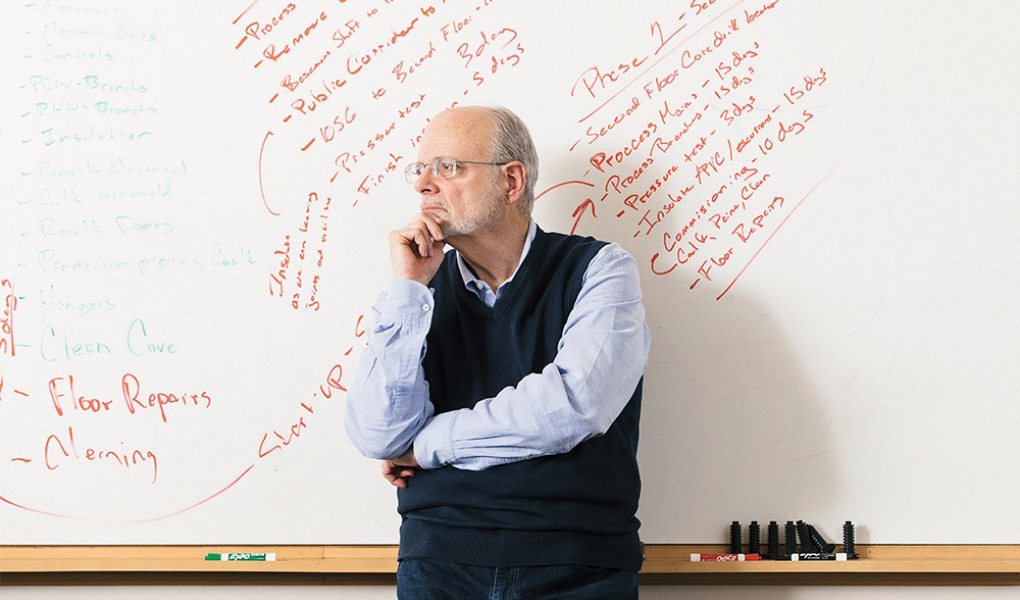Duke Experts: A Trusted Source for Policymakers
At every level of government, Duke scholars are providing needed advice that is helping to shape COVID policy

The need for trusted knowledge and expertise is most valuable during a time of crisis. In response to the coronavirus, experts across Duke University and Duke Health have been critical in informing policymakers at the local, state, and national level. Scholars, doctors, and Duke administrators collaborate with policymakers every day, but have been increasingly engaged on public policy decisions as our nation responds to the unprecedented COVID-19 pandemic.
"We know these are challenging times, and we are inspired by the collaborative spirit across our communities.”
When the city of Durham began preparing for COVID-19, Mayor Steve Schewel contacted Duke University Hospital President, Dr. Tom Owens, to seek guidance on how the city should respond. Owens directed Schewel to Morgan Jones at Duke Health Strategic Planning, who has helped coordinate Duke Health’s modeling of the coronavirus. Jones is providing Schewel with regular modeling updates specific to Durham to inform policy decisions around the stay-at-home order and other steps the city has taken to prevent the spread of coronavirus.

“Duke Health remains committed to ensuring our communities have the highest quality of care available,” Jones said. “As a trusted partner to local and state colleagues, we have developed predictive models to equip leaders with real-time information, allowing them to craft policy, proactively plan resources, and drive decision-making. We know these are challenging times, and we are inspired by the collaborative spirit across our communities.”

Duke Health’s model for the coronavirus was one of the first in the state to predict hospital surge capacity. Leaders at Duke have since worked with other hospital systems in the state to share methodologies and best practices. In addition, a group of independent epidemiological and hospital demand modeling researchers from Duke collaborated on the first statewide model to predict hospital capacity and the spread of COVID-19. Other partners in the modeling group include researchers from UNC Chapel Hill, RTI International, NoviSci, Inc., and Blue Cross and Blue Shield of North Carolina.
Dr. Aaron McKethan, senior policy fellow at the Duke-Margolis Center for Health Policy, Dr. Alan Brookhart, professor at the School of Medicine, and Dr. Hilary Campbell, research associate at the Duke-Margolis Center for Health Policy, were among  the Duke experts who contributed to this research.
the Duke experts who contributed to this research.
“Modeling the longer-term effects of a new viral disease like COVID-19 is particularly challenging given how little we still know about the virus and the limitations of data,” McKethan said. “Modeling is imperfect, but like peering through a periscope, it can reveal something about the basic contours of the terrain before us to guide the journey ahead, while helping us avoid making costly policy mistakes.”
The Duke State Relations Office has also connected experts at Duke University and Duke Health with policymakers in North Carolina to collaborate on COVID-19 contact tracing, community prevalence testing and vaccine development. Duke is one of the world’s leading centers for research on viruses and vaccines, and is well-positioned to discover a vaccine for the coronavirus.

The Duke Human Vaccine Institute is a leader in this research, with an in-house Good Manufacturing (GMP) facility to test vaccines and countermeasures and a Regional Biocontainment Laboratory in partnership with the National Institutes of Health (NIH). Director of the Duke Human Vaccine Institute Dr. Barton Haynes recently presented to several key state legislators and liaisons from Governor Roy Cooper’s office on the work being done at Duke to find a treatment for the coronavirus and to discuss a potential state-funded research partnership for vaccine development.

Leaders continue to seek Duke experts for statewide coronavirus initiatives. Last week, Gov. Cooper announced a path forward for combatting COVID-19 in North Carolina, which focuses on testing, tracing, and trends. In response to the governor’s plan, a task force was created consisting of researchers from Duke University, UNC Chapel Hill, East Carolina University, and the NC Department of Health and Human Services (NC DHHS) to study community prevalence of COVID-19.
Duke researchers will assist the state in looking at the prevalence of the disease and antibodies in certain populations to determine the rate of immunity. As part of the governor’s plans to increase COVID-19 testing capabilities in the state, NC DHHS also recently created a Testing Surge Work Group. Dr. Michael Datto, medical director for Duke University Health System Clinical Laboratories, is part of this group to develop a plan to expand COVID-19 testing sites and options, and address testing supply challenges for the state to move forward with lifting stay-at-home measures.
“Modeling is imperfect, but like peering through a periscope, it can reveal something about the basic contours of the terrain before us to guide the journey ahead, while helping us avoid making costly policy mistakes.”
On the national level, members of Congress and President Trump’s administration have relied on experts from Duke University and Duke Health for policy decisions and to better understand how the coronavirus has impacted institutions of higher education and hospitals. Duke Health Government Relations and Duke University Government Relations have continued to connect federal government officials with Duke leadership on updates with financial impact, supply chain issues, surge planning, testing capabilities and innovative research.
Catherine Liao, associate vice president for Duke Health Government Relations, explained the challenge of communicating policy issues with federal government leaders during this time.
 “Typically, members of Congress and their staff spend time visiting and interacting with Duke Health experts to inform policy decisions,” Liao said. “They meet in-person with faculty and leadership to experience first-hand the health care challenges and innovations happening at Duke Health to provide real-world context and impact. Right now, that can’t happen, but they are making important federal policy decisions that have a very real impact on our COVID-19 response. Duke Health Government Relations is ensuring that the on-ground perspective about our COVID-19 challenges continues during this time so that our delegation has the information they need.”
“Typically, members of Congress and their staff spend time visiting and interacting with Duke Health experts to inform policy decisions,” Liao said. “They meet in-person with faculty and leadership to experience first-hand the health care challenges and innovations happening at Duke Health to provide real-world context and impact. Right now, that can’t happen, but they are making important federal policy decisions that have a very real impact on our COVID-19 response. Duke Health Government Relations is ensuring that the on-ground perspective about our COVID-19 challenges continues during this time so that our delegation has the information they need.”
With face-to-face interactions out of the question, Duke has gotten creative in its ways to communicate with policymakers. Duke in DC has partnered with Duke’s Program in American Grand Strategy to coordinate several virtual briefings for congressional staff on topics related to COVID-19. Additionally, the Sanford School of Public Policy has hosted regular virtual briefings, sharing faculty research through policy briefs, and connecting information with policymakers via social media.
“It is both inspiring and reassuring to see the number of Duke faculty members who have answered the call to provide analysis to policymakers.”
The Duke-Margolis Center for Health Policy has been at the forefront of engaging with policymakers over the last two months to advance a comprehensive national COVID-19 response. Researchers at Duke-Margolis are disseminating research and recommendations through policy papers, legislative briefings, and numerous media appearances. Dr. Mark McClellan, director of the Duke-Margolis Center for Health Policy, has been a leader in the discussion on what is needed to re-open the economy in North Carolina and across the country. McClellan and his team have collaborated with policy leaders on the local, state, national, and international level to map out key steps needed to emerge from this pandemic successfully.
Mike Schoenfeld, Duke’s vice president for public affairs and government relations, recognizes the value Duke researchers can offer policymakers at this critical time.
“Public policy will have a direct and immediate impact on public health, which is why the engagement of Duke experts with local, state and national policymakers can just as vital as laboratory research,” Schoenfeld said. “It is both inspiring and reassuring to see the number of Duke faculty members who have answered the call to provide analysis to policymakers.”